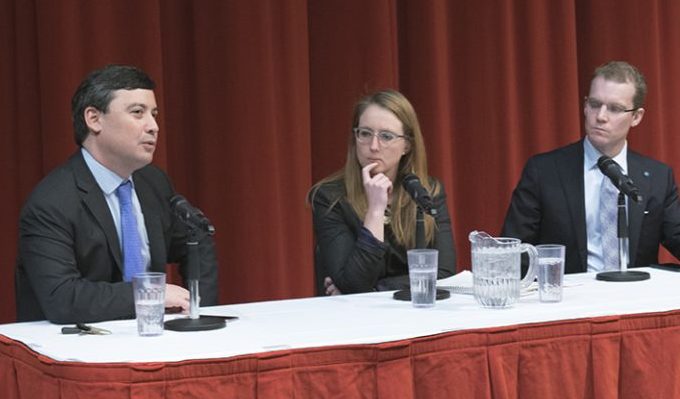Political parties in Canada need to be reformed before we change how the public votes, Conservative leadership candidate Michael Chong told a forum at the University of Toronto on Thursday.
“Currently in our system, party leaders make the final determination and final approval for party candidates,” he said. “If we embark on electoral reform, without first reforming political parties, we in effect give a portion of the seats to the party leader.”
The MP was speaking the public event, Parliament at 150: The Road Forward, about electoral reform at the George Ignatieff Theatre at U of T.
“I think Justin Trudeau broke his promise,” he said about the Liberals abandoning electoral reform. “Millions of people voted for him in the hope he would fulfill his commitment on electoral reform.”
But electoral reform should focus more on the centralization of power in Parliament for the political parties and the Prime Minister, he said.
The free event was a collaboration with the Canada 150 fund, nonprofit group Samara Canada, U of T’s Department of Political Science, and U of T’s Model Parliament student group.
Chong was keynote speaker of the event, along with Jane Hilderman of Samara Canada. University of Toronto Scarborough professor Christopher Cochrane also addressed the event.
In 2013, Chong introduced the Reform Act, which gave MPs more power from their federal political parties and the Prime Minister. The bill was contested in the House of Commons and eventually passed in 2015. It was put into law shortly after the 2015 federal election.
“The first thing that changed was that we elected our interim leader, Rona Ambrose for the first time,” he said. “Previously, the interim leader was appointed by the outgoing leader.
Also, he noted the Conservative leader has lost the right to expel a member from caucus, and that decision is now up to the caucus on a secret ballot vote.
Hilderman spoke about the issues with political participation for women and young people in Canadian politics. Hilderman took part in Samara’s MP Exit Interviews, in which the group interviewed former MPs about their experiences in Parliament.
“What we hope a project like the Exit Interviews can do is bring forward the voice of former MPs and reduce the hurdles that are holding us up from making change in our institutions,” she said.
Chong proposed free membership for all political parties and simplifying the registration process, as part of his campaign for the Conservative Party leadership. He saidt the Internet can make the process cheaper and more accessible for people to be more politically engaged.
“By making party membership free, we can attract hundreds of thousands of new people to political parties, hundreds of thousands of new people to the political process,” he said.

